2012年中考英语语法复习—非谓语动词
文档属性
| 名称 | 2012年中考英语语法复习—非谓语动词 |  | |
| 格式 | zip | ||
| 文件大小 | 320.6KB | ||
| 资源类型 | 教案 | ||
| 版本资源 | 通用版 | ||
| 科目 | 英语 | ||
| 更新时间 | 2012-03-25 20:18:05 | ||
图片预览

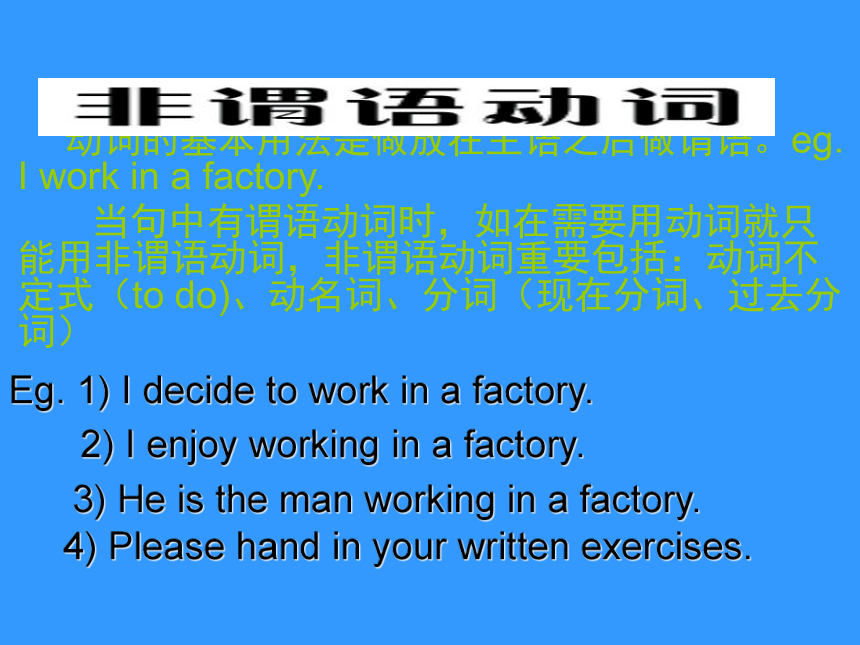
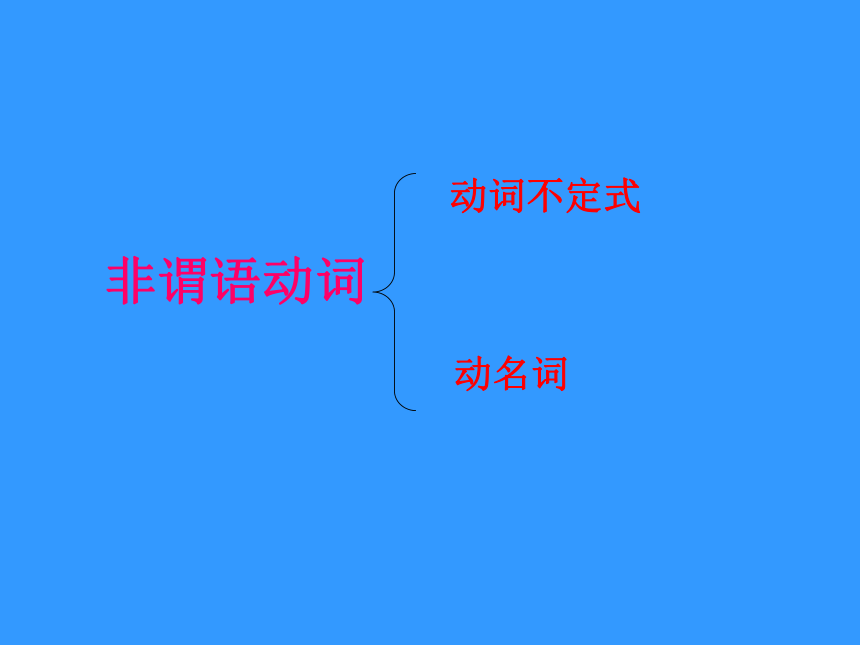
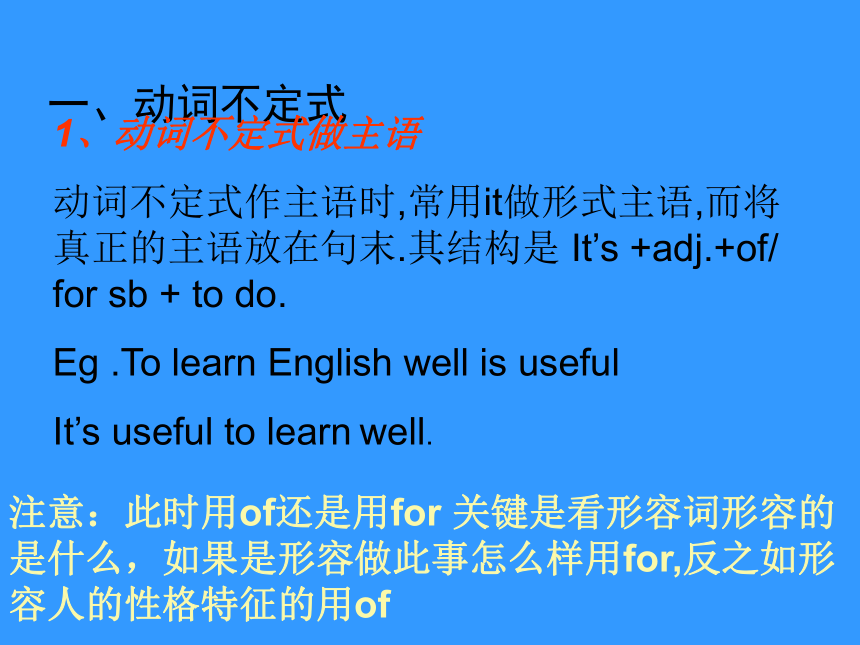
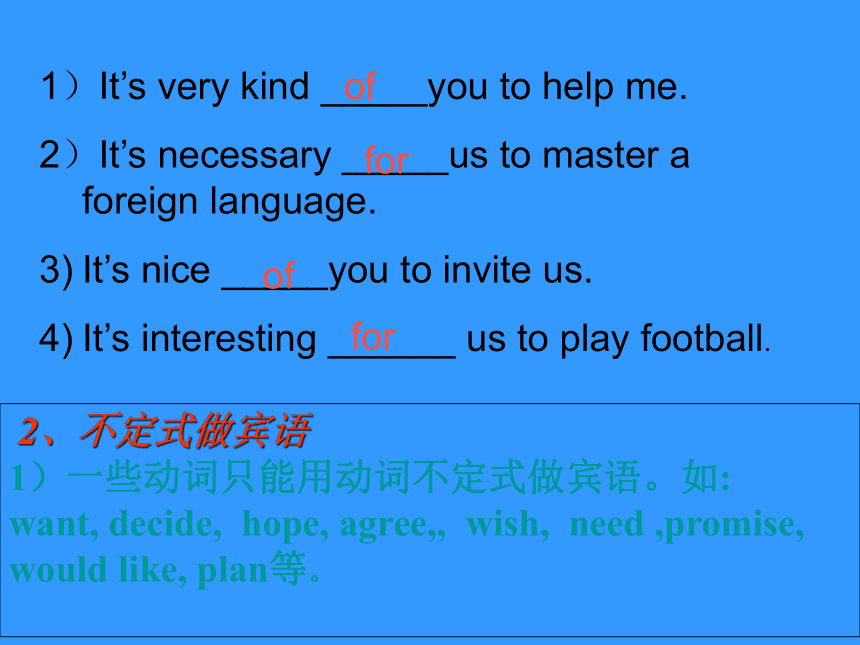
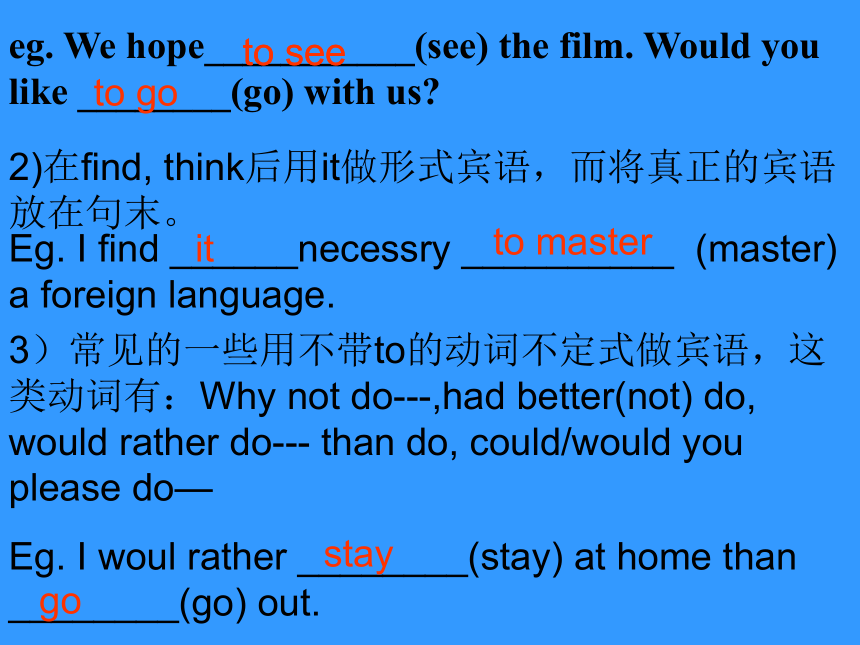
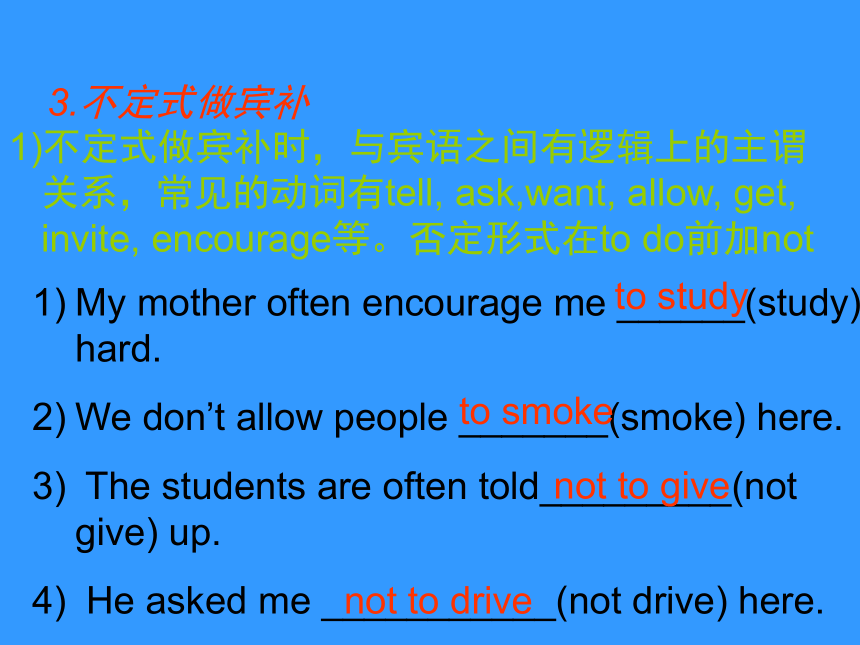
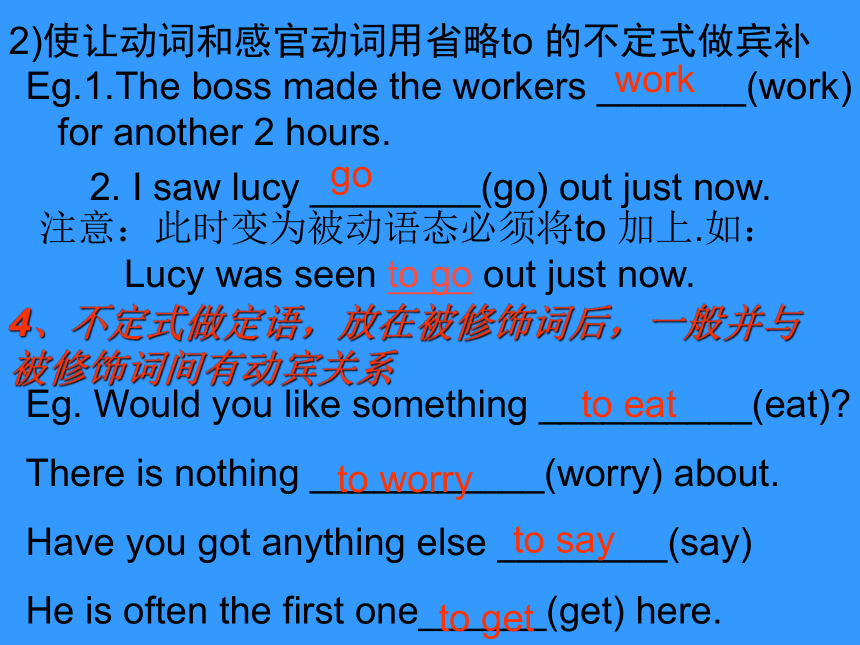
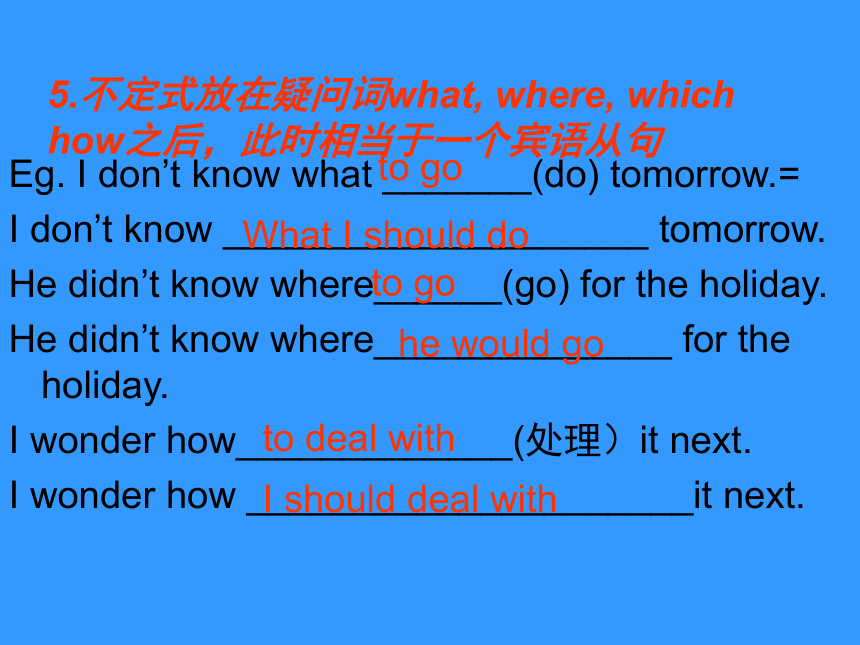
文档简介
(共30张PPT)
非谓语动词
中考语法专项复习
动词的基本用法是做放在主语之后做谓语。eg. I work in a factory.
当句中有谓语动词时,如在需要用动词就只能用非谓语动词,非谓语动词重要包括:动词不定式(to do)、动名词、分词(现在分词、过去分词)
Eg. 1) I decide to work in a factory.
2) I enjoy working in a factory.
3) He is the man working in a factory.
4) Please hand in your written exercises.
非谓语动词
动词不定式
动名词
一、动词不定式
1、动词不定式做主语
动词不定式作主语时,常用it做形式主语,而将真正的主语放在句末.其结构是 It’s +adj.+of/ for sb + to do.
Eg .To learn English well is useful
It’s useful to learn well.
注意:此时用of还是用for 关键是看形容词形容的是什么,如果是形容做此事怎么样用for,反之如形容人的性格特征的用of
1)It’s very kind _____you to help me.
2)It’s necessary _____us to master a foreign language.
It’s nice _____you to invite us.
It’s interesting ______ us to play football.
of
for
of
for
2、不定式做宾语
1)一些动词只能用动词不定式做宾语。如:
want, decide, hope, agree,, wish, need ,promise, would like, plan等。
eg. We hope___________(see) the film. Would you like ________(go) with us
to see
to go
2)在find, think后用it做形式宾语,而将真正的宾语放在句末。
Eg. I find ______necessry __________ (master) a foreign language.
to see
it
to master
3)常见的一些用不带to的动词不定式做宾语,这类动词有:Why not do---,had better(not) do, would rather do--- than do, could/would you please do—
Eg. I woul rather ________(stay) at home than ________(go) out.
stay
go
3.不定式做宾补
1)不定式做宾补时,与宾语之间有逻辑上的主谓关系,常见的动词有tell, ask,want, allow, get, invite, encourage等。否定形式在to do前加not
My mother often encourage me ______(study) hard.
We don’t allow people _______(smoke) here.
The students are often told_________(not give) up.
He asked me ___________(not drive) here.
to study
to smoke
not to give
not to drive
2)使让动词和感官动词用省略to 的不定式做宾补
Eg.1.The boss made the workers _______(work) for another 2 hours.
2. I saw lucy ________(go) out just now.
work
go
4、不定式做定语,放在被修饰词后,一般并与被修饰词间有动宾关系
Eg. Would you like something __________(eat)
There is nothing ___________(worry) about.
Have you got anything else ________(say)
He is often the first one______(get) here.
to eat
to worry
to say
to get
注意:此时变为被动语态必须将to 加上.如: Lucy was seen to go out just now.
5.不定式放在疑问词what, where, which how之后,此时相当于一个宾语从句
Eg. I don’t know what _______(do) tomorrow.=
I don’t know ____________________ tomorrow.
He didn’t know where______(go) for the holiday.
He didn’t know where______________ for the holiday.
I wonder how_____________(处理)it next.
I wonder how _____________________it next.
I should deal with
to go
What I should do
to deal with
he would go
to go
二、动名词
1.动名词做主语,此时谓语动词用单数
Eg. ________(collect) stamps ____(be) my favorite.
Collecting
is
2.动名词做动词或介词的宾语。此类动词有 keep, enjoy,prefer…to , mind, can’t help, finish,feel like,practise ,
Would you mind __________(smoke) here
Knives are used for ____________(cut) things.
smoking
cutting
1.做定语,单个的分词作定语放在被修饰词前,分词短语作定语放在被修饰词的后面。
三、分词。
分词分为现在分词(动词+ing)和过去分词两种,现在分词表示主动进行,过去分词表被动、完成。
1)This is a _________(read) room.
2) His __________(speak) English is very good.
3) Do you know the man _________(stand) under the tree.
4) The woman swept the leaves ________(fall ) on the ground.
fallen
standing
spoken
reading
2.现在分词作状语,表伴随
Eg. The students went out of the class, _____ (talk) and __________(laugh)
talking
laughing
3.分词作宾语补足语。现在分词作宾补与宾语之间有逻辑上的主谓关系(主动),过去分词作宾补与宾语之间有逻辑上的动宾关系(被动)。
Eg. Don’t keep us __________(wait) for so long.
She speaks loudly to make herself_______(hear).
I heard her _________(sing) in the next room when I passed by.
We have to make our hair _______(cut)
waiting
heard
singing
cut
四、注意区分:
1、动词不定式做宾语与动名词做宾语
A:无差别 begin , start
Let’s begin ______________(have) an English class.
to have /having
B:有一定差别 like , love, hate
Doing表示爱好,to do 表示具体动作。如:
I like ___________(swim) a lot ,but this evening I love _______(go) skating.
swimming
to go
C:差别很大
动词 + to do sth.(未做) +doing sth.(已做)
remember 记得要做某事 记得曾做某事
forget 忘记做某事 忘记做了某事
stop 停下来去做另一事 停止正做的事
try 尽力去做某事 尝试做某事
She tried a composition.
她试着写作文。
writing
她设法(尽力)打电话给你。
She tried you .
to call
I remember the door just now.
我记得我刚才开了门。
opening
Please remember the door after work.
to close
请记住下班后关门。
I forgot him the news.
我忘记已经告诉他这个消息了。
I forgot him the news .
to tell
我忘记了告诉他这个消息。
telling
Test
一、选择
1. He has promised better latter.
A. behaving B. behave C. to behave
2. He hated her.
A. trouble B. to troubling C. to trouble
3. He stopped when the teacher came in.
A. to talk B. talking C. talked
4. I have finished the room.
A. clean B. to read it C. cleaning
5. I give you a book .
A. to read B. to read it C. reading it
6. There is nothing for us .
A. to worry B. to worry about C. worrying about
C
C
B
C
A
B
二、改错
1. One day a cat hold a mouse and wanted eating it.
2. I enjoy listening foreign music.
3. The workers were made work day and night.
4. Please let me to get out of this dirty place.
( to eat )
( to )
( to )
5. At last he agreed stay here.
6. After they got to the top of the mountain , they
stopped having a rest.
7. She would like staying at home on Sundays.
8. I told the boy don’t to tie the dog under the tree.
( to )
( to have )
( to stay )
( not )
2.动词不定时做宾补与现在分词做宾补
感官动词既可以跟不带to的不定式做宾补也可以跟现在分词做宾补,用不定式做宾补表示的动作经常做或做了,跟现在分词做宾补表示动作正在进行。
1) I saw her _________(play) basketball when I met her.
2) I often saw her _______(play) basketball last week.
3) I heard lucy________(go) downstairs and _______(go) out.
playing
play
go
go
3.need,want require+to do 与doing
My bike needs ________(repair),and I want ______(repair) it.
repairing
to repair
To do 表示被动,与主语有逻辑上的动宾关系,doing 表示主动,与主语有逻辑上的主谓关系
4. –ing与-ed
如:interesting 与interested;exciting与excited等的区别。 如:
I’m very _____________(surprise) at the ___________(surprise) matter.
surprised
surprising
5、注意介词to 在短语中的应用 + doing
make a contribution to(为做---做贡献),
pay attention to(注意做---),
look forward to(盼望做---),
prefer---to----(喜欢---而不喜欢),
be used to(习惯于做---)
We’d better ____ at once .
A. start B. to start C. starting D. started
2. I saw him ____ in the classroom .
A. sleep B. slept C. to sleep D. sleeping
3. We have worked long hours . Let’s stop ___ a rest.
A. to have B. having C. from having D. have
4. I’d love ___ a movie .
A. to see B. see C. seeing D. saw
5. Don’t forget ____ the light before you go out .
A. to turn on B. to turn off C. turn off D. turning on
6. I told you ____ in class.
A. to sleep B. not to sleep C. not sleeping
7. Sorry , I have kept you ____ so long .
A. wait B. waited C. to wait D. waiting
8. The bad weather stopped us ____ a picnic.
A. to have B. having C. from having D. had
A
A
A
A
B
B
D
C
9. Why not ___ games with your classmate
A. to play B. playing C. play D. played
10.Tom doesn’t know _____ a bike
A. how to ride B. how ride C. how does he ride
11.I ‘m thirsty .Can I have something ____
A. eating B. to drink C. drinking D. to eat
12. We are not sure ____
A. when to leave B. when leave C, when leaves
13. Hanmei stopped ___ the cleaning and listened to
music.
A. to do B. doing C. and did D. did
14. ___ is interesting ___ football.
A. It , play B. This , to play C. It , to play
15. I often watch him ____tennis.
A. to play B. play C. playing D. plays
C
A
D
A
B
C
B
16.Have you finished ___ the book
No, I’ll try ___ it to you
A. reading , to return B. reading , returning
C. to read, returning D. to read , to return
17. The boss made the workers ___ long hours
A. to work B. work C. working D. worked
18. The doctor told us ___ more water.
A. to drink B. drinking C. drink D. drank
19.Why don’t you stop ___ Begin ___!
A. talking, to work B. to work , talking
C. to talk , to work D. working, talking
20. My brother enjoys ___ to music.
A. listen B. to listen C. listening D.listened
21. Thank you for ___ me your pen.
A.borrow B. borrowing C. to lend D. lending
A
B
A
A
C
D
1,--Can you tell me ______English at home
--Listen to the English programme.
A, how to read B, how to learn
C, when to use D, where to use
2, Please tell Lin Feng ______to turn off the
lights when he __________.
A, to not forget , leave
B, don’t forget, will leave
C, not forget , leaving
D, not to forget , leaves
3, ---Would you mind ______with me
---Of course not .
A, taking photos B, to take photos
C, takes photos D, take photos
B
D
A
4, ---Jenny , let me tell you a secret. I
am tired of my mum these days .
--Why
--She makes me ____at Nanshan stadium
every Sunday afternoon.
A, dance B, danced
C, to dance D, dancing
5, It’s nice ________me with my Chinese
A, for you to help B, of you to help
C, to you of helping
6, --Why don’t you start the machine
--This is new and I don’t know ______it
A, where to start B, when to start
C, how to start D, what to start
A
B
C C
7, When I went by Jean’s house , I heard
her ______a song to the music in the room .
A, to sing B, sang C, singing D, sings
8, She makes you ______and you like her
very much . A, laughing B, to laugh
C, laugh D, laughed
9, I don’t know __________.
A, which one to choose
B, to choose which one
C, which to choose one
10, Can you let him____ home a little earlier
A, go B, goes C, to go
11, She stopped ______ and talked to me .
A, working B, to work C, works
C
C
A
A
A
12, Remember _______the lights before
you leave the lab . A, to turn off
B, turning off C, turn off
13, She was heard ______a song last night .
A, sang B, sings C, to sing
14, Tim was so busy ______a novel that he
______to have dinner. A, reading, forgets
B, to read , forgot C, reading , forgot
15, My father enjoys ______to light music .
A, listens B, to listen C, listening
16, Thank you for _______me !
A, tell B, telling C, to tell
17, It’s time ______. A, play games
B, to play games C, playing games
A
C
C
C
B
B
非谓语动词
中考语法专项复习
动词的基本用法是做放在主语之后做谓语。eg. I work in a factory.
当句中有谓语动词时,如在需要用动词就只能用非谓语动词,非谓语动词重要包括:动词不定式(to do)、动名词、分词(现在分词、过去分词)
Eg. 1) I decide to work in a factory.
2) I enjoy working in a factory.
3) He is the man working in a factory.
4) Please hand in your written exercises.
非谓语动词
动词不定式
动名词
一、动词不定式
1、动词不定式做主语
动词不定式作主语时,常用it做形式主语,而将真正的主语放在句末.其结构是 It’s +adj.+of/ for sb + to do.
Eg .To learn English well is useful
It’s useful to learn well.
注意:此时用of还是用for 关键是看形容词形容的是什么,如果是形容做此事怎么样用for,反之如形容人的性格特征的用of
1)It’s very kind _____you to help me.
2)It’s necessary _____us to master a foreign language.
It’s nice _____you to invite us.
It’s interesting ______ us to play football.
of
for
of
for
2、不定式做宾语
1)一些动词只能用动词不定式做宾语。如:
want, decide, hope, agree,, wish, need ,promise, would like, plan等。
eg. We hope___________(see) the film. Would you like ________(go) with us
to see
to go
2)在find, think后用it做形式宾语,而将真正的宾语放在句末。
Eg. I find ______necessry __________ (master) a foreign language.
to see
it
to master
3)常见的一些用不带to的动词不定式做宾语,这类动词有:Why not do---,had better(not) do, would rather do--- than do, could/would you please do—
Eg. I woul rather ________(stay) at home than ________(go) out.
stay
go
3.不定式做宾补
1)不定式做宾补时,与宾语之间有逻辑上的主谓关系,常见的动词有tell, ask,want, allow, get, invite, encourage等。否定形式在to do前加not
My mother often encourage me ______(study) hard.
We don’t allow people _______(smoke) here.
The students are often told_________(not give) up.
He asked me ___________(not drive) here.
to study
to smoke
not to give
not to drive
2)使让动词和感官动词用省略to 的不定式做宾补
Eg.1.The boss made the workers _______(work) for another 2 hours.
2. I saw lucy ________(go) out just now.
work
go
4、不定式做定语,放在被修饰词后,一般并与被修饰词间有动宾关系
Eg. Would you like something __________(eat)
There is nothing ___________(worry) about.
Have you got anything else ________(say)
He is often the first one______(get) here.
to eat
to worry
to say
to get
注意:此时变为被动语态必须将to 加上.如: Lucy was seen to go out just now.
5.不定式放在疑问词what, where, which how之后,此时相当于一个宾语从句
Eg. I don’t know what _______(do) tomorrow.=
I don’t know ____________________ tomorrow.
He didn’t know where______(go) for the holiday.
He didn’t know where______________ for the holiday.
I wonder how_____________(处理)it next.
I wonder how _____________________it next.
I should deal with
to go
What I should do
to deal with
he would go
to go
二、动名词
1.动名词做主语,此时谓语动词用单数
Eg. ________(collect) stamps ____(be) my favorite.
Collecting
is
2.动名词做动词或介词的宾语。此类动词有 keep, enjoy,prefer…to , mind, can’t help, finish,feel like,practise ,
Would you mind __________(smoke) here
Knives are used for ____________(cut) things.
smoking
cutting
1.做定语,单个的分词作定语放在被修饰词前,分词短语作定语放在被修饰词的后面。
三、分词。
分词分为现在分词(动词+ing)和过去分词两种,现在分词表示主动进行,过去分词表被动、完成。
1)This is a _________(read) room.
2) His __________(speak) English is very good.
3) Do you know the man _________(stand) under the tree.
4) The woman swept the leaves ________(fall ) on the ground.
fallen
standing
spoken
reading
2.现在分词作状语,表伴随
Eg. The students went out of the class, _____ (talk) and __________(laugh)
talking
laughing
3.分词作宾语补足语。现在分词作宾补与宾语之间有逻辑上的主谓关系(主动),过去分词作宾补与宾语之间有逻辑上的动宾关系(被动)。
Eg. Don’t keep us __________(wait) for so long.
She speaks loudly to make herself_______(hear).
I heard her _________(sing) in the next room when I passed by.
We have to make our hair _______(cut)
waiting
heard
singing
cut
四、注意区分:
1、动词不定式做宾语与动名词做宾语
A:无差别 begin , start
Let’s begin ______________(have) an English class.
to have /having
B:有一定差别 like , love, hate
Doing表示爱好,to do 表示具体动作。如:
I like ___________(swim) a lot ,but this evening I love _______(go) skating.
swimming
to go
C:差别很大
动词 + to do sth.(未做) +doing sth.(已做)
remember 记得要做某事 记得曾做某事
forget 忘记做某事 忘记做了某事
stop 停下来去做另一事 停止正做的事
try 尽力去做某事 尝试做某事
She tried a composition.
她试着写作文。
writing
她设法(尽力)打电话给你。
She tried you .
to call
I remember the door just now.
我记得我刚才开了门。
opening
Please remember the door after work.
to close
请记住下班后关门。
I forgot him the news.
我忘记已经告诉他这个消息了。
I forgot him the news .
to tell
我忘记了告诉他这个消息。
telling
Test
一、选择
1. He has promised better latter.
A. behaving B. behave C. to behave
2. He hated her.
A. trouble B. to troubling C. to trouble
3. He stopped when the teacher came in.
A. to talk B. talking C. talked
4. I have finished the room.
A. clean B. to read it C. cleaning
5. I give you a book .
A. to read B. to read it C. reading it
6. There is nothing for us .
A. to worry B. to worry about C. worrying about
C
C
B
C
A
B
二、改错
1. One day a cat hold a mouse and wanted eating it.
2. I enjoy listening foreign music.
3. The workers were made work day and night.
4. Please let me to get out of this dirty place.
( to eat )
( to )
( to )
5. At last he agreed stay here.
6. After they got to the top of the mountain , they
stopped having a rest.
7. She would like staying at home on Sundays.
8. I told the boy don’t to tie the dog under the tree.
( to )
( to have )
( to stay )
( not )
2.动词不定时做宾补与现在分词做宾补
感官动词既可以跟不带to的不定式做宾补也可以跟现在分词做宾补,用不定式做宾补表示的动作经常做或做了,跟现在分词做宾补表示动作正在进行。
1) I saw her _________(play) basketball when I met her.
2) I often saw her _______(play) basketball last week.
3) I heard lucy________(go) downstairs and _______(go) out.
playing
play
go
go
3.need,want require+to do 与doing
My bike needs ________(repair),and I want ______(repair) it.
repairing
to repair
To do 表示被动,与主语有逻辑上的动宾关系,doing 表示主动,与主语有逻辑上的主谓关系
4. –ing与-ed
如:interesting 与interested;exciting与excited等的区别。 如:
I’m very _____________(surprise) at the ___________(surprise) matter.
surprised
surprising
5、注意介词to 在短语中的应用 + doing
make a contribution to(为做---做贡献),
pay attention to(注意做---),
look forward to(盼望做---),
prefer---to----(喜欢---而不喜欢),
be used to(习惯于做---)
We’d better ____ at once .
A. start B. to start C. starting D. started
2. I saw him ____ in the classroom .
A. sleep B. slept C. to sleep D. sleeping
3. We have worked long hours . Let’s stop ___ a rest.
A. to have B. having C. from having D. have
4. I’d love ___ a movie .
A. to see B. see C. seeing D. saw
5. Don’t forget ____ the light before you go out .
A. to turn on B. to turn off C. turn off D. turning on
6. I told you ____ in class.
A. to sleep B. not to sleep C. not sleeping
7. Sorry , I have kept you ____ so long .
A. wait B. waited C. to wait D. waiting
8. The bad weather stopped us ____ a picnic.
A. to have B. having C. from having D. had
A
A
A
A
B
B
D
C
9. Why not ___ games with your classmate
A. to play B. playing C. play D. played
10.Tom doesn’t know _____ a bike
A. how to ride B. how ride C. how does he ride
11.I ‘m thirsty .Can I have something ____
A. eating B. to drink C. drinking D. to eat
12. We are not sure ____
A. when to leave B. when leave C, when leaves
13. Hanmei stopped ___ the cleaning and listened to
music.
A. to do B. doing C. and did D. did
14. ___ is interesting ___ football.
A. It , play B. This , to play C. It , to play
15. I often watch him ____tennis.
A. to play B. play C. playing D. plays
C
A
D
A
B
C
B
16.Have you finished ___ the book
No, I’ll try ___ it to you
A. reading , to return B. reading , returning
C. to read, returning D. to read , to return
17. The boss made the workers ___ long hours
A. to work B. work C. working D. worked
18. The doctor told us ___ more water.
A. to drink B. drinking C. drink D. drank
19.Why don’t you stop ___ Begin ___!
A. talking, to work B. to work , talking
C. to talk , to work D. working, talking
20. My brother enjoys ___ to music.
A. listen B. to listen C. listening D.listened
21. Thank you for ___ me your pen.
A.borrow B. borrowing C. to lend D. lending
A
B
A
A
C
D
1,--Can you tell me ______English at home
--Listen to the English programme.
A, how to read B, how to learn
C, when to use D, where to use
2, Please tell Lin Feng ______to turn off the
lights when he __________.
A, to not forget , leave
B, don’t forget, will leave
C, not forget , leaving
D, not to forget , leaves
3, ---Would you mind ______with me
---Of course not .
A, taking photos B, to take photos
C, takes photos D, take photos
B
D
A
4, ---Jenny , let me tell you a secret. I
am tired of my mum these days .
--Why
--She makes me ____at Nanshan stadium
every Sunday afternoon.
A, dance B, danced
C, to dance D, dancing
5, It’s nice ________me with my Chinese
A, for you to help B, of you to help
C, to you of helping
6, --Why don’t you start the machine
--This is new and I don’t know ______it
A, where to start B, when to start
C, how to start D, what to start
A
B
C C
7, When I went by Jean’s house , I heard
her ______a song to the music in the room .
A, to sing B, sang C, singing D, sings
8, She makes you ______and you like her
very much . A, laughing B, to laugh
C, laugh D, laughed
9, I don’t know __________.
A, which one to choose
B, to choose which one
C, which to choose one
10, Can you let him____ home a little earlier
A, go B, goes C, to go
11, She stopped ______ and talked to me .
A, working B, to work C, works
C
C
A
A
A
12, Remember _______the lights before
you leave the lab . A, to turn off
B, turning off C, turn off
13, She was heard ______a song last night .
A, sang B, sings C, to sing
14, Tim was so busy ______a novel that he
______to have dinner. A, reading, forgets
B, to read , forgot C, reading , forgot
15, My father enjoys ______to light music .
A, listens B, to listen C, listening
16, Thank you for _______me !
A, tell B, telling C, to tell
17, It’s time ______. A, play games
B, to play games C, playing games
A
C
C
C
B
B
同课章节目录
- 词法
- 名词
- 动词和动词短语
- 动词语态
- 动词时态
- 助动词和情态动词
- 非谓语动词
- 冠词
- 代词
- 数词和量词
- 形容词副词及其比较等级
- 介词和介词短语
- 连词和感叹词
- 构词法
- 相似、相近词比较
- 句法
- 陈述句
- 一般疑问句和否定疑问句
- 特殊疑问句及选择疑问句
- 反意疑问句
- 存在句(There be句型)
- 宾语从句
- 定语从句
- 状语从句
- 主谓一致问题
- 简单句
- 并列句
- 复合句
- 主谓一致
- 主、表语从句
- 名词性从句
- 直接引语和间接引语
- 虚拟语气
- 感叹句
- 强调句
- 倒装句
- 祈使句
- 句子的成分
- 句子的分类
- 题型专区
- 单项选择部分
- 易错题
- 完形填空
- 阅读理解
- 词汇练习
- 听说训练
- 句型转换
- 补全对话
- 短文改错
- 翻译
- 书面表达
- 任务型阅读
- 语法填空
- 其他资料
